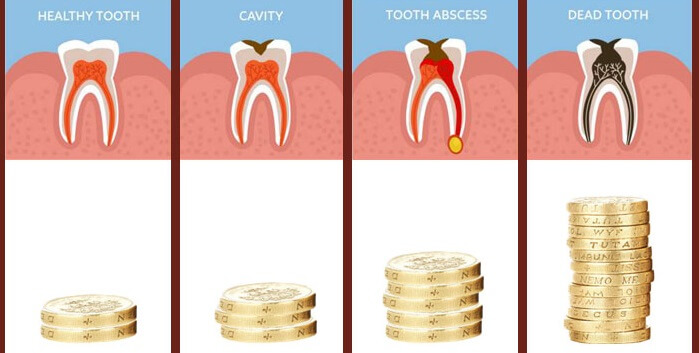
As we look at ways we can cut discretionary costs, the topic of dentistry often comes up. Typically when an economy slows, discretionary spend on dental care decreases. With the exception of urgent care, we tend to delay dental appointments until we feel more financially secure. However, research shows that this can be a false economy as people who see a dentist and oral hygienist regularly need fewer dental treatments and spend less in the long run. It’s simple: preventative dental care saves money.
Take a simple cavity for example. Usually this will begin hurting only when it reaches the tooth’s nerves. Unfortunately, by this time a normal filling may not be sufficient – instead a root canal and/or crown might be necessary, which are much more invasive and expensive procedures. Your dentist, however, can identify and treat a cavity when it is just starting.
During Alert Level 4 the Fraser Dental team provided emergency dental care at our sister practice McIntosh Dental, in Henderson. During this time we treated a patient who had not been to the dentist for 10 years. He had suddenly woken up in agony and needed a series of costly procedures to eradicate a tooth abscess. If he had maintained regular dental appointments he could have avoided that financial burden, not to mention the pain and stress it caused him. That one tooth cost him far more than 10 years’ worth of preventative dental care.
Another example of prevention being better than cure is a patient we treated earlier this year with a cracked molar. Like so many people, she couldn’t remember the last time she had visited a dentist and believed her teeth were healthy enough because they didn’t hurt. Although the cracked molar required just a simple filling replacement, unfortunately we also diagnosed her with moderate periodontal disease. Periodontal disease, or periodontitis, is gum disease with increasing stages of severity. It is believed to affect up to half of Kiwi adults, but it is also preventable with regular dental treatments and maintaining good oral hygiene routines at home. This patient is now undergoing an intensive deep cleaning treatment programme to prevent further disease advancement. Again, the cost of this far out-weighs regular annual check-ups and hygiene appointments.
Preventative dental care is not only good for your health – it’s also good for your budget! Prevention is always better (and cheaper) than repair.



